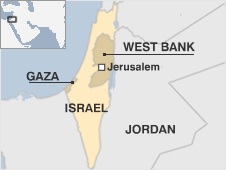 |
The division of the former British mandate of Palestine and the creation of the state of Israel in the years after the end of World War II have been at the heart of Middle Eastern conflicts for the past half century.
The creation of Israel was the culmination of the Zionist movement, whose aim was a homeland for Jews scattered all over the world following the Diaspora. After the Nazi Holocaust, pressure grew for the international recognition of a Jewish state, and in 1948 Israel came into being.
.gif)
![]()
![]()
ISRAEL
MARKET (Products from Taj
Pharmaceuticals Limited) INDIA
Overview
Much of the history of the region since that time has been one of conflict between Israel on one side and Palestinians, represented by the Palestine Liberation Organisation, and Israel's Arab neighbours, on the other. Hundreds of thousands of Palestinians were displaced, and several wars were fought involving Egypt, Jordan, Syria and Lebanon.
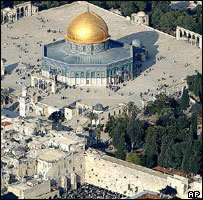 Jerusalem's Temple Mount, or Haram al-Sharif
|
Palestinians in the West Bank, including east Jerusalem, have lived under Israeli occupation since 1967. The settlements that Israel has built in the West Bank are home to around 400,000 people and are deemed to be illegal under international law, although Israel disputes this.
Israel evacuated its settlers from the Gaza Strip in 2005 and withdrew its forces, ending almost four decades of military occupation. However, after the militant Islamic group Hamas seized control of Gaza in June 2007, Israel intensified its economic blockade of the Strip.
In 1979 Egypt and Israel signed a peace agreement, but it wasn't until the early 1990s, after years of an uprising known as the intifada, that a peace process began with the Palestinians. Despite the handover of Gaza and parts of the West Bank to Palestinian control, a "final status" agreement has yet to be reached.
The main stumbling blocks include the status of Jerusalem and the fate of Palestinian refugees and Jewish settlements.
Facts
ISRAEL FACTS
- Full name: State of Israel
- Population: 7.2 million (UN, 2009)
- Seat of government: Jerusalem, though most foreign embassies are in Tel Aviv
- Area: Israeli Central Bureau of Statistics cites 22,072 sq km (8,522 sq miles), including Jerusalem and Golan
- Major languages: Hebrew, Arabic
- Major religions: Judaism, Islam
- Life expectancy: 79 years (men), 83 years (women) (UN)
- Monetary unit: 1 new Israeli shekel (NIS) = 100 new agorot
- Main exports: Computer software, military equipment, chemicals, agricultural products
- GNI per capita (Israel only): US $24,700 (World Bank, 2008)
- Internet domain: .il
- International dialling code: +972
PALESTINIAN FACTS
- Population: 4.3 million (UN, 2009)
- Intended seat of government: East Jerusalem
- Area: Palestinian Ministry of Information cites 5,970 sq km (2,305 sq miles) for West Bank territories and 365 sq km (141 sq miles) for Gaza
- Major language: Arabic
- Major religion: Islam
- Life expectancy: 72 years (men), 75 years (women) (UN)
- Monetary unit: 1 Jordan dinar = 1,000 fils, 1 new Israeli shekel (NIS) = 100 new agorot
- Main exports: Citrus
- GNI per capita: US $1,230 (estimated, World Bank, 2007)
- Internet domain: .ps
- International dialling code: +970
Leaders
Israeli president: Shimon Peres
The Israeli president has a mainly ceremonial role; executive power is vested in the cabinet, headed by the prime minister.
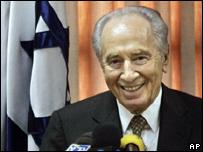
Israel's elder statesman: Shimon Peres
|
On 13 June 2007, the Israeli parliament chose the veteran politician Shimon Peres to succeed Moshe Katsav, who had taken leave of absence from the presidency earlier in the year after being accused of various sexual offences.
Mr Katsav formally resigned on 29 June after agreeing to plead guilty to several of the offences as part of a plea bargain that removed two rape charges against him.
Though the post is largely ceremonial, the president has in the past been seen by many Israelis as the nation's moral compass, and many hoped that Mr Peres would restore dignity to what they saw as a tarnished office.
Mr Peres was a leading member of the Labour party for decades, but left in 2005 and later joined the centrist Kadima party.
He has twice been prime minister, and in 1994 was awarded the Nobel Peace Prize in recognition of his role in bringing about the signing of Israel's first interim peace accord with the Palestine Liberation Organisation in Oslo the previous year.
Israeli prime minister: Binyamin Netanyahu
Binyamin Netanyahu, the leader of the right-wing Likud party, became prime minister after an inconclusive early election in February 2009, a decade after holding the office once before.
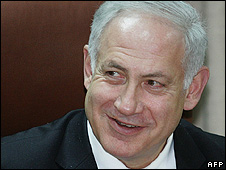
Mr Netanyahu campaigned on a policy of toughness towards Palestinian militancy
|
The vote was called when his predecessor, Ehud Olmert, of the centrist Kadima party, resigned amid corruption allegations, and Mr Olmert's designated successor, Tzipi Livni, failed to put together a new centre-left coalition.
Mrs Livni and Kadima actually won one more seat in the Knesset (parliament) than Likud, but right-wing parties emerged stronger than the left overall.
Mr Netanyahu, widely seen as one of Israel's most right-wing leaders, formed a coalition with the nationalist Yisrael Beiteinu party, various religious parties, as well as the centre-left Labour party.
Despite Labour's inclusion, the coalition's composition sparked fears that it would be too hard-line on the peace process with the Palestinians.
During the election campaign, Mr Netanyahu stressed his longstanding opposition to handing back land occupied by Israel in return for peace.
The prime minister continued to resist pressure from US President Barack Obama's administration for a complete suspension of Israeli settlement activity - a key Palestinian condition for a return to stalled peace talks.
Several months after his election, however, Mr Netanyahu said he would accept the creation of Palestinian state, but only on the condition that it is completely demilitarised.
Palestinian leaders criticised the conditions set by Mr Netanyahu, and said the policy change was insincere.
Mr Netanyahu also promised to make the perceived threat of Iran's nuclear programme a priority in security policy.
During his previous term as prime minister, from 1996, Mr Netanyahu was hostile towards the Palestinian Authority created by the peace process, but also revealed flexibility: In 1997, he agreed to cede most of the West Bank town of Hebron.
Defeated by Labour leader Ehud Barak in 1999, he later went to serve as finance minister under Likud Prime Minister Ariel Sharon, pushing through a series of market-oriented reforms before resigning in 2005 in protest at Mr Sharon's decision to pull out from Gaza.
Mr Netanyahu was born in 1949 in Tel Aviv, spending part of his childhood in the United States. During his five years in Israel's army, he served as captain of an elite commando unit.
A fluent English-speaker, Mr Netanyahu has been a prominent advocate for Israel in the international media.
Palestinian leader: Mahmoud Abbas
Former Palestinian Prime Minister Mahmoud Abbas, the candidate of the Fatah faction, won the January 2005 poll to replace the late Palestinian leader Yasser Arafat.
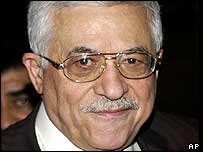
Palestinian leader Mahmoud Abbas
|
Mr Abbas, also known as Abu Mazen, had already succeeded Yasser Arafat as leader of the Palestinian Liberation Organisation (PLO), having been Mr Arafat's deputy since 1969.
The surprise victory of the militant Islamic movement Hamas in parliamentary polls in January 2006 led to heightened tension between the Palestinian factions. There were recurring bouts of violence between Hamas and Mr Abbas's Fatah faction, raising fears of civil war. In February 2007, Hamas and Fatah agreed to form a government of national unity.
However, in June 2007 Hamas took control of the Gaza strip, seriously challenging the concept of a coalition, which Abbas subsequently dissolved.
Mr Abbas's current term was set to have ended in January 2009, but in 2008 announced he was extending his term by another year, in order to allow presidential and parliamentary elections to be held at the same time. The move was denounced by Hamas.
In November 2009, Mr Abbas said he would not stand again in elections scheduled for 24 January 2010, in protest against the continuing impasse in attempts to resurrect peace talks with Israel.
Many analysts regard Mahmoud Abbas as a moderate.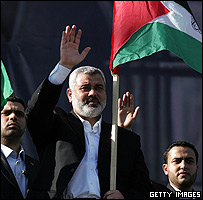 He has condemned the armed Palestinian uprising and favours the resumption of negotiations with Israel. But he faces the challenge of persuading armed groups to stop their campaign of anti-Israeli attacks.
He has condemned the armed Palestinian uprising and favours the resumption of negotiations with Israel. But he faces the challenge of persuading armed groups to stop their campaign of anti-Israeli attacks.
Mahmoud Abbas was born in 1935 in Safed, a town in present-day northern Israel. He co-founded Fatah - the main political grouping within the PLO - with Yasser Arafat in the late 1950s.
He established contacts with left-wing Israelis in the 1970s and was the main Palestinian architect of the 1993 Oslo accords, which led to the foundation of the Palestinian Authority.
His brief stint as premier was plagued by power struggles with Mr Arafat over the control of the Palestinian security apparatus and over planned reforms. Mr Abbas resigned in September 2003.
The former Palestinian leader Yasser Arafat died in a French hospital on 11 November 2004, aged 75.
Media
ISRAELI MEDIA
Israel's press and broadcasters are many and varied, and account for differences in language, political viewpoint and religious outlook.
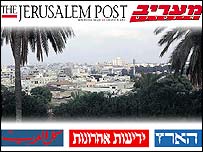 |
The Israel Broadcasting Authority (IBA), set up along the lines of the BBC, operates public radio and TV services and is funded mainly by licence fees on TV sets.
Channel 2 and Israel 10 are the main commercial TV networks. Most Israeli households subscribe to cable or satellite packages.
Commercial radio arrived in 1995, but faces competition from unlicensed radio stations, some of which carry ultra-Orthodox programming.
All Israeli newspapers are privately-owned; many are available on the internet.
In its 2007 report, media rights watchdog Reporters Without Borders said Israel's journalists "enjoy a freedom not found elsewhere in the region" but added that Palestinian journalists "faced many restrictions by the Israeli authorities".
The press
- Yediot Aharonot - Tel Aviv-based daily
- Ha'aretz - Tel Aviv-based daily
- Jerusalem Post - daily
- Ma'ariv - Tel Aviv-based daily
- Globes - business daily
Television
- Israel Broadcasting Authority - public TV, operates Channel 1
- Channel 2 - national, commercial
- Israel 10 - national, commercial
Radio
- Israel Broadcasting Authority - operates public radios, including speech-based Reshet Aleph, news-based Reshet Bet, music-based Reshet Gimmel, Arabic-language Reshet Dalet
- Galei Zahal - Israel Defence Forces (IDF) Radio, broadcasts news and music to mostly-civilian audience; also operates music and traffic news network Galgalatz
Internet
Israel has a large IT industry and one of the world's most technologically-literate populations. Around 3.7 million people had internet access by 2006 (via Internet World Stats).
PALESTINIAN MEDIA
Television is the key source for news and information in the Palestinian areas.
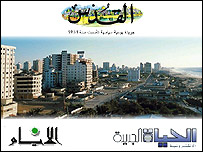 |
Official broadcasting is run by the Palestinian Broadcasting Corporation (PBC) which operates Voice of Palestine radio and Palestine TV. These outlets came under the jurisdiction of the Palestinian president in early 2006; the move was seen as an attempt to prevent the new Hamas-dominated government from exerting control over the official media.
There are dozens of private TV and radio stations. Jordanian TV is widely-watched in the West Bank. Pan-Arab satellite broadcasters, including Qatar's Al-Jazeera TV, are popular.
International watchdogs regard the media as being generally more independent than in much of the rest of the Arab world. However, journalists risk harassment, attack or arrest by the security services, armed activists or militant groups. Self-censorship is widespread.
Media rights watchdog Reporters Without Borders said in 2007 that Palestinian and foreign journalists were "victims of fierce clashes" between Hamas and Fatah.
The press
- Al-Quds - private, Jerusalem-based, largest-circulation Palestinian daily
- Al-Ayyam - private, Ramallah-based daily
- Al-Hayat Al-Jadidah - Palestinian National Authority daily
Radio
- Palestinian Broadcasting Corporation (PBC) - controlled by Palestinian leadership in Ramallah, operates Voice of Palestine
Television
- Palestinian Broadcasting Corporation (PBC) - controlled by Palestinian leadership in Ramallah, operates Palestine TV and Palestine Satellite Channel
- Al-Aqsa TV - Hamas-run station in Gaza, terrestrial and via satellite
- Private stations include Al-Quds Educational TV, Al-Mahd TV, Al-Majd TV, Al-Nawras TV, Watan TV
News agencies
- Palestine News Agency - Wafa - official, in Arabic, English, French and Hebrew
- Ma'an News Agency - private, operates with Dutch, Danish funding
Internet
Around 243,000 people had internet access by 2006 (via Internet World Stats).
AFRICA
|
ASIA-PACIFIC
|
AMERICAS
|
EUROPE
| MIDDLEEAST |
SOUTHASIA
Mauritania
Mauritius
Morocco
Mozambique
Namibia
Niger
Nigeria
Republic-of-congo
Rwanda
Sao-tome-and-principe
Senegal Seychelles
Sierra-leone
Somalia
South-africa
Sudan
Swaziland
Tanzania
The-gambia
Togo
Tunisia
Uganda
zambia
Zimbabwe
Australia
Brunei
Burma
Cambodia
China
East-timor
Fiji
Indonesia
Japan
Kazakhstan
Kiribati
Kyrgyzstan
Laos
Malaysia
Marshall-islands
Micronesia
Mongolia
Nauru
New-zealand
North-korea
Palau
Papua-new-guinea
Samoa
Singapore
Solomon-islands
South-korea
Taiwan
Tajikistan
Thailand
The-philippines
Tonga
Turkmenistan
Tuvalu
Uzbekistan
Vanuatu
Vietnam
Antigua-and-barbuda
Argentina
Bahamas
Barbados
Belize
Bolivia
Brazil
Canada
Chile
Colombia
Costa-rica
Cuba
Dominica
Dominican-republic
Ecuador
El-salvador
Grenada
Guatemala
GuyanaHaiti
Honduras
Jamaica
Mexico
Nicaragua
Panama
Paraguay
Peru
St-kitts-and-nevis
St-lucia
St-vincent-and-the-grenadines
Suriname
Trinidad-and-tobago
United-states-of-america
Uruguay
Venezuela
Albania
Andorra
Armenia
Austria
Azerbaijan
Belarus
Belgium
Bosnia-hercegovina
Bulgaria
Croatia
Cyprus
Czech-republic
Denmark
Estonia
Finland
France
Georgia
Germany
Greece
Hungary
Iceland
Ireland
Italy
Latvia
Liechtenstein
Lithuania
Luxembourg
Macedonia
Malta
Moldova
Monaco
Montenegro
Norway
Poland
Portugal
Russia
San-marino
Serbia
Slovakia
Slovenia
Spain
Sweden
Switzerland
The-netherlands
Turkey
Ukraine
United-kingdom
Vatican
Algeria
Egypt
Iran
Iraq
Israel-and-palestinian-territories
Jordan
Kuwait
Lebanon
Libya
Mauritania
Oman
Saudi-arabia
Sudan
Syria
Tunisia
United-arab-emirates
Yemen
Afghanistan
Bangladesh
Bhutan
India
Nepal
Pakistan
Sri-Lanka
The-Maldives

